formerly eScholarship Editions


|
|
|
|
Your request for similar items found 20 book(s). | Modify Search | Displaying 1 - 20 of 20 book(s) | |
| 1. | 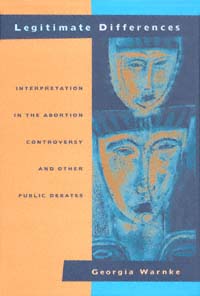 | Title: Legitimate differences: interpretation in the abortion controversy and other public debates Author: Warnke, Georgia Published: University of California Press, 1999 Subjects: Philosophy | Social and Political Thought | Gender Studies Publisher's Description: Legitimate Differences challenges the usual portrayal of current debates over thorny social issues including abortion, pornography, affirmative action, and surrogate mothering as moral debates. How can it be said that our debates oppose principles of life to those of liberty, principles of liberty to those of equality, principles of equality to those of fairness, and principles of fairness to those of integrity, when we as Americans share all these principles?Debates over such issues are not, Georgia Warnke argues, moral debates over which principles we should adopt. Rather, they are interpretive debates over the meanings of principles we already possess. Warnke traces the structure of these debates with reference to the work of Jane Austen, Hans-Georg Gadamer, Jürgen Habermas, and Bernard Williams. In separate chapters on surrogate mothering, affirmative action, abortion, and pornography she articulates new understandings of the meanings of some of our principles and shows the equal legitimacy of some different interpretations of the meanings of others. Finally, she suggests that the orientation of American public policy ought to be directed less at finding single canonical interpretations of our principles than at accommodating different legitimate understandings of them. The perspective offered by Legitimate Differences should have a significantly beneficial effect on public discussions. [brief] Similar Items |
| 2. | 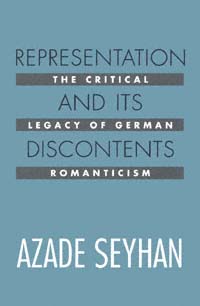 | Title: Representation and its discontents: the critical legacy of German romanticism Author: Seyhan, Azade Published: University of California Press, 1992 Subjects: Philosophy | Literary Theory and Criticism | German Studies Publisher's Description: Azade Seyhan provides a concise, elegantly argued introduction to the critical theory of German Romanticism and demonstrates how its approach to the metaphorical and linguistic nature of knowledge is very much alive in contemporary philosophy and literary theory. Her analysis of key thinkers such as Friedrich Schlegel and Novalis explores their views on rhetoric, systematicity, hermeneutics, and cultural interpretation. Seyhan examines German Romanticism as a critical intervention in the debates on representation, which developed in response to the philosophical revolution of German Idealism.Facing a chaotic political and intellectual landscape, the eighteenth-century theorists sought new models of understanding and new objectives for criticism and philosophy. Representation and Its Discontents identifies the legacy of this formative moment in modern criticism and suggests its relevance to contemporary discussions of post-structuralism, orientalism, theories of textuality, and the nature of philosophical discourse. [brief] Similar Items |
| 3. | 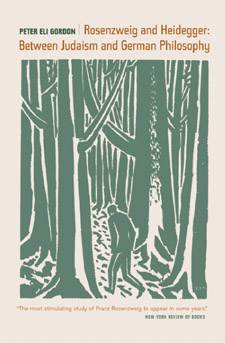 | Title: Rosenzweig and Heidegger: between Judaism and German philosophy Author: Gordon, Peter Eli Published: University of California Press, 2003 Subjects: History | German Studies | Religion | Judaism | European History | Intellectual History | Jewish Studies | Social and Political Thought Publisher's Description: Franz Rosenzweig (1886-1929) is widely regarded today as one of the most original and intellectually challenging figures within the so-called renaissance of German-Jewish thought in the Weimar period. The architect of a unique kind of existential theology, and an important influence upon such philosophers as Walter Benjamin, Martin Buber, Leo Strauss, and Emmanuel Levinas, Rosenzweig is remembered chiefly as a "Jewish thinker," often to the neglect of his broader philosophical concerns. Cutting across the artificial divide that the traumatic memory of National Socialism has drawn between German and Jewish philosophy, this book seeks to restore Rosenzweig's thought to the German philosophical horizon in which it first took shape. It is the first English-language study to explore Rosenzweig's enduring debt to Hegel's political theory, neo-Kantianism, and life-philosophy; the book also provides a new, systematic reading of Rosenzweig's major work, The Star of Redemption. Most of all, the book sets out to explore a surprising but deep affinity between Rosenzweig's thought and that of his contemporary, the German philosopher Martin Heidegger. Resisting both apologetics and condemnation, Gordon suggests that Heidegger's engagement with Nazism should not obscure the profound and intellectually compelling bond in the once-shared tradition of modern German and Jewish thought. A remarkably lucid discussion of two notably difficult thinkers, this book represents an eloquent attempt to bridge the forced distinction between modern Jewish thought and the history of modern German philosophy - and to show that such a distinction cannot be sustained without doing violence to both. [brief] Similar Items |
| 4. | 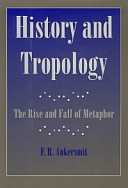 | Title: History and tropology: the rise and fall of metaphor Author: Ankersmit, F. R Published: University of California Press, 1994 Subjects: Philosophy | Literary Theory and Criticism | Intellectual History Publisher's Description: "The chief business of twentieth-century philosophy is to reckon with twentieth-century history," claimed Collingwood. In this remarkable collection of essays, many published for the first time, Frank Ankersmit demonstrates the prescience of that remark and goes a long way toward meeting its challenge. Responding to the work of Hayden White, Arthur Danto, and Hans-Georg Gadamer, he examines such issues as the difference between historical representation and artistic expression, the status of metaphor in historical description, and the relation of postmodernism to historicism. Ankersmit's fluent grasp of European thought and his ability to incorporate concepts from literary theory, art history, the philosophy of science, and political thought into his analyses assure that this collection will interest readers throughout the humanities. [brief] Similar Items |
| 5. | 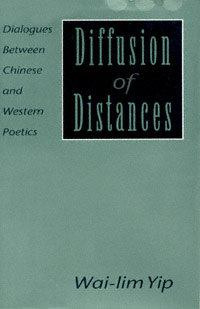 | Title: Diffusion of distances: dialogues between Chinese and Western poetics Author: Yip, Wai-lim Published: University of California Press, 1993 Subjects: Literature | Asian Studies | Philosophy | China | Asian Literature Publisher's Description: In this collection of passionately argued essays, the internationally acclaimed poet and critic Wai-lim Yip calls Western scholarship to account for its treacherous representation of non-Western literature. Yip moves from Plato to Hans-Georg Gadamer, from Chuang-tzu to Mao Tse-tung, from John Donne to Robert Creeley, as he attempts to create a double consciousness that includes the state of mind of the original author and the expressive potentials of the target language. He aims, first, to expose the types of distortions that have occurred in the process of translation from one language to another and, second, to propose guidelines that will prevent this kind of linguistic violence in the future. [brief] Similar Items |
| 6. | 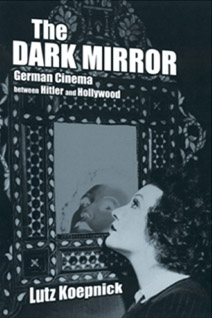 | Title: The dark mirror: German cinema between Hitler and Hollywood Author: Koepnick, Lutz P. (Lutz Peter) Published: University of California Press, 2002 Subjects: Cinema and Performance Arts | German Studies | Music | Film Publisher's Description: Lutz Koepnick analyzes the complicated relationship between two cinemas - Hollywood's and Nazi Germany's - in this theoretically and politically incisive study. The Dark Mirror examines the split course of German popular film from the early 1930s until the mid 1950s, showing how Nazi filmmakers appropriated Hollywood conventions and how German film exiles reworked German cultural material in their efforts to find a working base in the Hollywood studio system. Through detailed readings of specific films, Koepnick provides a vivid sense of the give and take between German and American cinema. [brief] Similar Items |
| 7. | 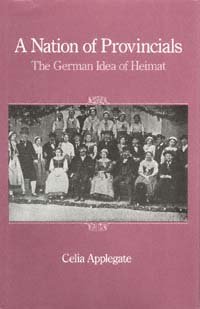 | Title: A nation of provincials: the German idea of Heimat Author: Applegate, Celia Published: University of California Press, 1990 Subjects: History | European History | German Studies Publisher's Description: At the center of this pioneering work in modern European history is the German word Heimat - the homeland, the local place. Translations barely penetrate the meaning of the word, which has provided the emotional and ideological common ground for a variety of associations and individuals devoted to the cause of local preservation. Celia Applegate examines at both the national and regional levels the cultural meaning of Heimat and why it may be pivotal to the troubled and very timely question of German identity.The ideas and activities clustered around Heimat shed new light particularly on problems of modernization. Instead of viewing the Germans as a dangerously anti-modern people, Applegate argues that they used the cultivation of Heimat to ground an abstract nationalism in their attachment to familiar places and to reconcile the modern industrial and urban world with the rural landscapes and customs they admired. Primarily a characteristic of the middle classes, love of Heimat constituted an alternative vision of German unity to the familiar aggressive, militaristic one. The Heimat vision of Germany emphasized cultural diversity and defined German identity by its internal members rather than its external enemies.Applegate asks that we re-examine the continuities of German history from the perspective of the local places that made up Germany, rather than from that of prominent intellectuals or national policymakers. The local patriotism of Heimat activists emerges as an element of German culture that persisted across the great divides of 1918, 1933, and 1945. She also suggests that this attachment to a particular place is a feature of Europeans in general and is deserving of further attention. [brief] Similar Items |
| 8. | 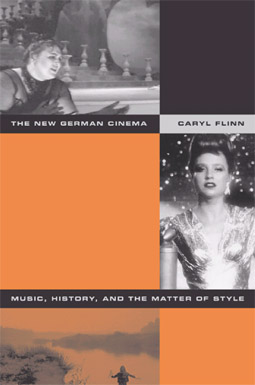 | Title: The new German cinema: music, history, and the matter of style Author: Flinn, Caryl Published: University of California Press, 2003 Subjects: Cinema and Performance Arts | German Studies | Music Publisher's Description: When New German cinema directors like R. W. Fassbinder, Ulrike Ottinger, and Werner Schroeter explored issues of identity - national, political, personal, and sexual - music and film style played crucial roles. Most studies of the celebrated film movement, however, have sidestepped the role of music, a curious oversight given its importance to German culture and nation formation. Caryl Flinn's study reverses this trend, identifying styles of historical remembrance in which music participates. Flinn concentrates on those styles that urge listeners to interact with difference - including that embodied in Germany's difficult history - rather than to "master" or "get past" it. Flinn breaks new ground by considering contemporary reception frameworks of the New German Cinema, a generation after its end. She discusses transnational, cultural, and historical contexts as well as the sexual, ethnic, national, and historical diversity of audiences. Through detailed case studies, she shows how music helps filmgoers engage with a range of historical subjects and experiences. Each chapter of The New German Cinema examines a particular stylistic strategy, assessing music's role in each. The study also examines queer strategies like kitsch and camp and explores the movement's charged construction of human bodies on which issues of ruination, survival, memory, and pleasure are played out. [brief] Similar Items |
| 9. | 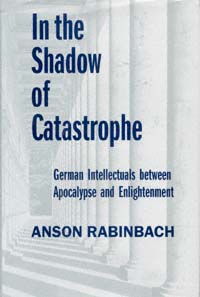 | Title: In the shadow of catastrophe: German intellectuals between apocalypse and enlightenment Author: Rabinbach, Anson Published: University of California Press, 1997 Subjects: History | German Studies | Social and Political Thought | Philosophy Publisher's Description: These essays by eminent European intellectual and cultural historian Anson Rabinbach address the writings of key figures in twentieth-century German philosophy. Rabinbach explores their ideas in relation to the two world wars and the horrors facing Europe at that time.Analyzing the work of Benjamin and Bloch, he suggests their indebtedness to the traditions of Jewish messianism. In a discussion of Hugo Ball's little-known Critique of the German Intelligentsia , Rabinbach reveals the curious intellectual career of the Dadaist and antiwar activist turned-nationalist and anti-Semite. His examination of Heidegger's "Letter on Humanism" and Jaspers's The Question of German Guilt illuminates the complex and often obscure political referents of these texts. Turning to Horkheimer and Adorno's Dialectic of Enlightenment , Rabinbach offers an arresting new interpretation of this central text of the critical theory of the Frankfurt School. Subtly and persuasively argued, his book will become an indispensable reference point for all concerned with twentieth-century German history and thought. [brief] Similar Items |
| 10. | 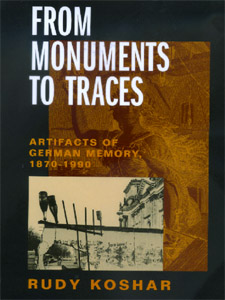 | Title: From monuments to traces: artifacts of German memory, 1870-1990 Author: Koshar, Rudy Published: University of California Press, 2000 Subjects: German Studies | History | Architectural History | European History Publisher's Description: Rudy Koshar constructs a powerful framework in which to examine the subject of German collective memory, which for more than a half century has been shaped by the experience of Nazism, World War II, and the Holocaust. Finding the assumptions of many writers and scholars shortsighted, Koshar surveys the evidence of postwar German memory in the context of previous traditions. From Monuments to Traces follows the evolution of German "memory landscapes" all the way from national unification in 1870-71 through the world wars and political division to reunification in 1990. The memory landscapes of any society may incorporate monuments, historical buildings, memorials and cemeteries, battlefields, streets, or natural environments that foster shared memories of important events or personalities. They may also be designed to divert public attention from embarrassing or traumatic histories. Koshar argues that in Germany, memory landscapes have taken shape according to four separate paradigms--the national monument, the ruin, the reconstruction, and the trace--which he analyzes in relation to the changing political agendas that have guided them over time. Despite the massive ruptures of Germany's history, we see that significant continuities have served to counterbalance the traumas of the German past. [brief] Similar Items |
| 11. | 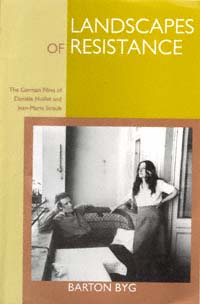 | Title: Landscapes of resistance: the German films of Danièle Huillet and Jean-Marie Straub Author: Byg, Barton 1953- Published: University of California Press, 1995 Subjects: Cinema and Performance Arts | Film | German Studies | Intellectual History Publisher's Description: Fervently admired and frequently reviled, Jean-Marie Straub and Danièle Huillet - who have lived and worked together for almost forty years - may well be the most uncompromising, not to say intransigent, filmmakers in the history of the medium. Their radical and deeply political films placed them as forerunners of the New German Cinema movement in the 1960s and influential figures in the subsequent explosion of the European avant-garde. In Landscapes of Resistance , Barton Byg fills a significant gap in modern German and European cinema studies by tracing the career of the two filmmakers and exploring their connection to German modernism, in particular their relationship to the Frankfurt School.Although they are not German themselves, Straub and Huillet have used German material as the basis for the majority of their films. They have transcribed prose by Böll and Kafka, operas by Schoenberg, and verse dramas by Holderlin. Byg explores how their work engages German culture with a critical distance and affection and confronts the artificiality of divisions between high and low culture. [brief] Similar Items |
| 12. | 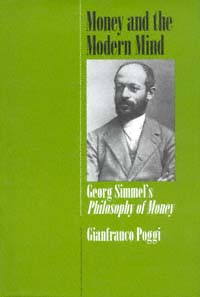 | Title: Money and the modern mind: George Simmel's Philosophy of money Author: Poggi, Gianfranco Published: University of California Press, 1993 Subjects: Social Science | Philosophy | Economics and Business | Social Theory | European Studies Publisher's Description: A major representative of the German sociological tradition, Georg Simmel (1858-1918) has influenced social thinkers ranging from the Chicago School to Walter Benjamin. His magnum opus, The Philosophy of Money , published in 1900, is nevertheless a difficult book that has daunted many would-be readers. Gianfranco Poggi makes this important work accessible to a broader range of scholars and students, offering a compact and systematically organized presentation of its main arguments.Simmel's insights about money are as valid today as they were a hundred years ago. Poggi provides a sort of reader's manual to Simmel's work, deepening the reader's understanding of money while at the same time offering a new appreciation of the originality of Simmel's social theory. [brief] Similar Items |
| 13. | 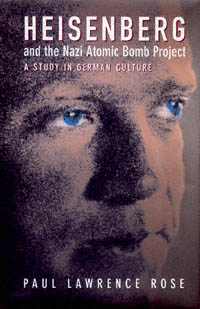 | Title: Heisenberg and the Nazi atomic bomb project: a study in German culture Author: Rose, Paul Lawrence Published: University of California Press, 1998 Subjects: History | European History | German Studies | European Studies | Science | Technology and Society | Physics | History and Philosophy of Science Publisher's Description: No one better represents the plight and the conduct of German intellectuals under Hitler than Werner Heisenberg, whose task it was to build an atomic bomb for Nazi Germany. The controversy surrounding Heisenberg still rages, because of the nature of his work and the regime for which it was undertaken. What precisely did Heisenberg know about the physics of the atomic bomb? How deep was his loyalty to the German government during the Third Reich? Assuming that he had been able to build a bomb, would he have been willing? These questions, the moral and the scientific, are answered by Paul Lawrence Rose with greater accuracy and breadth of documentation than any other historian has yet achieved.Digging deep into the archival record among formerly secret technical reports, Rose establishes that Heisenberg never overcame certain misconceptions about nuclear fission, and as a result the German leaders never pushed for atomic weapons. In fact, Heisenberg never had to face the moral problem of whether he should design a bomb for the Nazi regime. Only when he and his colleagues were interned in England and heard about Hiroshima did Heisenberg realize that his calculations were wrong. He began at once to construct an image of himself as a "pure" scientist who could have built a bomb but chose to work on reactor design instead. This was fiction, as Rose demonstrates: in reality, Heisenberg blindly supported and justified the cause of German victory. The question of why he did, and why he misrepresented himself afterwards, is answered through Rose's subtle analysis of German mentality and the scientists' problems of delusion and self-delusion. This fascinating study is a profound effort to understand one of the twentieth century's great enigmas. [brief] Similar Items |
| 14. | 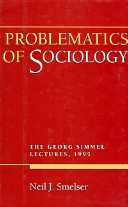 | Title: Problematics of sociology: the Georg Simmel lectures, 1995 Author: Smelser, Neil J Published: University of California Press, 1997 Subjects: Sociology | Social Theory Publisher's Description: These skillfully written essays are based on the Georg Simmel Lectures delivered by Neil J. Smelser at Humboldt University in Berlin in the spring of 1995. A distillation of Smelser's reflections after nearly four decades of research, teaching, and thought in the field of sociology, the essays identify, as he says in the first chapter, ". . . some central problematics - those generic, recurrent, never resolved and never completely resolvable issues - that shape the work of the sociologist."Each chapter considers a different level of sociological analysis: micro (the person and personal interaction), meso (groups, organizations, movements), macro (societies), and global (multi-societal). Within this framework, Smelser covers a variety of topics, including the place of the rational and the nonrational in social action and in social science theory; the changing character of group attachments in post-industrial society; the eclipse of social class; and the decline of the nation-state as a focus of solidarity.The clarity of Smelser's writing makes this a book that will be welcomed throughout the field of social science as well as by anyone wishing to understand sociology's essential characteristics and problems. [brief] Similar Items |
| 15. |  | Title: Where the world ended: re-unification and identity in the German borderland Author: Berdahl, Daphne 1964- Published: University of California Press, 1999 Subjects: Anthropology | Cultural Anthropology | German Studies | Geography | European Studies | Social Problems Publisher's Description: When the Berlin Wall fell, people who lived along the dismantled border found their lives drastically and rapidly transformed. Daphne Berdahl, through ongoing ethnographic research in a former East German border village, explores the issues of borders and borderland identities that have accompanied the many transitions since 1990. What happens to identity and personhood, she asks, when a political and economic system collapses overnight? How do people negotiate and manipulate a liminal condition created by the disappearance of a significant frame of reference?Berdahl concentrates especially on how these changes have affected certain "border zones" of daily life - including social organization, gender, religion, and nationality - in a place where literal, indeed concrete, borders were until recently a very powerful presence. Borders, she argues, are places of ambiguity as well as of intense lucidity; these qualities may in fact be mutually constitutive. She shows how, in a moment of headlong historical transformation, larger political, economic, and social processes are manifested locally and specifically. In the process of a transition between two German states, people have invented, and to some extent ritualized, cultural practices that both reflect and constitute profound identity transformations in a period of intense social discord. Where the World Ended combines a vivid ethnographic account of everyday life under socialist rule and after German reunification with an original investigation of the paradoxical human condition of a borderland. [brief] Similar Items |
| 16. | 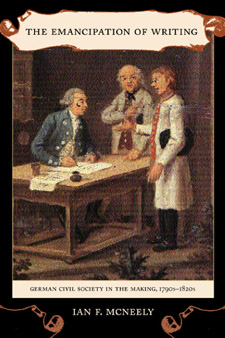 | Title: The emancipation of writing: German civil society in the making, 1790s-1820s Author: McNeely, Ian F 1971- Published: University of California Press, 2003 Subjects: History | European Studies | German Studies | European History | Sociology | Political Theory | Anthropology Publisher's Description: The Emancipation of Writing is the first study of writing in its connection to bureaucracy, citizenship, and the state in Germany. Stitching together micro- and macro-level analysis, it reconstructs the vibrant, textually saturated civic culture of the German southwest in the aftermath of the French Revolution and Napoleon's invasions. Ian F. McNeely reveals that Germany's notoriously oppressive bureaucracy, when viewed through the writing practices that were its lifeblood, could also function as a site of citizenship. Citizens, acting under the mediation of powerful local scribes, practiced their freedoms in written engagements with the state. Their communications laid the basis for civil society, showing how social networks commonly associated with the free market, the free press, and the voluntary association could also take root in powerful state institutions. [brief] Similar Items |
| 17. | 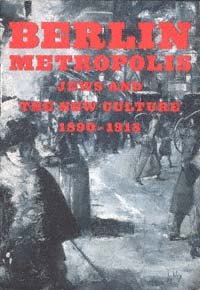 | Title: Berlin metropolis: Jews and the new culture, 1890-1918 Author: Bilski, Emily D 1956- Published: University of California Press, 2000 Subjects: Art | History | Jewish Studies | German Studies Publisher's Description: Between 1890 and 1918 the city of Berlin evolved into a commercial and industrial hub that also became an international center for radical new ideas in the visual, performing, and literary arts. Jews were key leaders in developing this unique cosmopolitan culture. Berlin Metropolis: Jews and the New Culture, 1890-1918 vividly documents the many ways that Jewish artists and entrepreneurs participated in this burst of artistic creativity and promoted the emergence of modernism on the international scene.The book and exhibition at The Jewish Museum highlight leading cultural figures such as Max Liebermann, a founder of the Berlin Secession, and Herwarth Walden, who founded Der Sturm; artists such as Ludwig Meidner and Jakob Steinhardt; pioneers of cabaret, theater, and film, including Max Reinhardt and Ernst Lubitsch; art dealers, publishers, and writers; and leading intellectual and political figures such as Martin Buber and Georg Simmel. These and other fascinating individuals are represented by more than 200 diverse objects: paintings, sculpture, drawings, prints, books, letters, posters, graphic arts, theater memorabilia, and film. The book includes eight essays by scholars of German and Jewish culture and art history that provide a truly interdisciplinary interpretation of the Berlin renaissance.The period represented in Berlin Metropolis was a time when Jews were traditionally restricted from participating in major areas of German public life such as the army, government, and the university. But by turning to the "alternative public spheres" characteristic of urban society - galleries, cafés, journals, theaters, cabarets - they emerged as innovative cultural leaders whose intellectual and artistic impact is still felt today.The exhibition, Berlin Metropolis: Jews and the New Culture, 1890-1918 , will be at The Jewish Museum, New York , from November 14, 1999, to March 5, 2000; and the Norton Museum of Art, West Palm Beach, Florida , from April 1 to June 11, 2000. [brief] Similar Items |
| 18. | 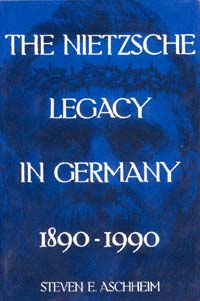 | Title: The Nietzsche legacy in Germany, 1890-1990 Author: Aschheim, Steven E 1942- Published: University of California Press, 1994 Subjects: German Studies | Intellectual History | Social and Political Thought | Politics | German Studies Publisher's Description: Countless attempts have been made to appropriate the ideas of Friedrich Nietzsche for diverse cultural and political ends, but nowhere have these efforts been more sustained and of greater consequence than in Germany. Aschheim offers a magisterial chronicle of the philosopher's presence in German li . . . [more] Similar Items |
| 19. | 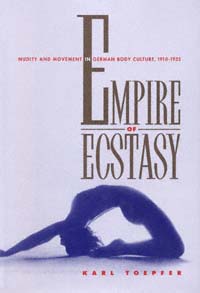 | Title: Empire of ecstasy: nudity and movement in German body culture, 1910-1935 Author: Toepfer, Karl Eric 1948- Published: University of California Press, 1997 Subjects: Cinema and Performance Arts | German Studies | Gender Studies | Dance Publisher's Description: Empire of Ecstasy offers a novel interpretation of the explosion of German body culture between the two wars - nudism and nude dancing, gymnastics and dance training, dance photography and criticism, and diverse genres of performance from solo dancing to mass movement choirs. Karl Toepfer presents this dynamic subject as a vital and historically unique construction of "modern identity." The modern body, radiating freedom and power, appeared to Weimar artists and intelligentsia to be the source of a transgressive energy, as well as the sign and manifestation of powerful, mysterious "inner" conditions. Toepfer shows how this view of the modern body sought to extend the aesthetic experience beyond the boundaries imposed by rationalized life and to transcend these limits in search of ecstasy. With the help of much unpublished or long-forgotten archival material (including many little-known photographs), he investigates the process of constructing an "empire" of appropriative impulses toward ecstasy. Toepfer presents the work of such well-known figures as Rudolf Laban, Mary Wigman, and Oskar Schlemmer, along with less-known but equally fascinating body culture practitioners. His book is certain to become required reading for historians of dance, body culture, and modernism. [brief] Similar Items |
| 20. | 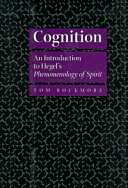 | Title: Cognition: an introduction to Hegel's Phenomenology of spirit Author: Rockmore, Tom 1942- Published: University of California Press, 1997 Subjects: Philosophy | Intellectual History Publisher's Description: Hegel's Phenomenology of Spirit , the philosopher's first and perhaps greatest work, is the most important philosophical treatise of the nineteenth century. In this companion volume to his general introduction to Hegel, Tom Rockmore offers a passage-by-passage guide to the Phenomenology for first-time readers of the book and others who are not Hegel specialists.Rockmore demonstrates that Hegel's concepts of spirit, consciousness, and reason can be treated as elements of a single, coherent theory of knowledge, one that remains strikingly relevant for the contemporary discussion. He shows how the various conceptions of cognition developed in the text culminate in absolute knowing, which Rockmore reads, in opposition to the frequent religious readings of Hegel, in a wholly secular manner. Unlike commentators who isolate Hegel's text from its philosophical origins, Rockmore analyzes the book in the philosophical context from which it emerged, lucidly discussing notoriously difficult passages in relation to the ideas of Aristotle and Descartes, and above all to those of Kant and other German idealists. [brief] Similar Items |